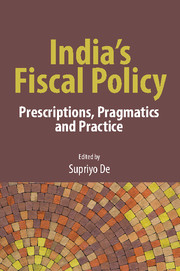Book contents
- Frontmatter
- Contents
- Foreword
- Acknowledgements
- Disclaimer
- Introduction: Contours of the Indian Fiscal Policy Debate
- 1 Fiscal Policy in India: Trends and Trajectory
- 2 Decentralization, Indirect Tax Reform and Fiscal Federalism in India
- 3 Fiscal Implications of Energy Subsidies
- 4 Fiscal Implications of Food Security in India: A Critical Review
- 5 Land and Food Acts: Trading Economic Pragmatism for Political Gain
- 6 A Separate Debt Management Office in India
- 7 Show Me the Cash: Direct Benefits Transfer in India
- 8 India's Education Challenges: Expenditure Effectiveness Issues
- List of Contributors
- Index
2 - Decentralization, Indirect Tax Reform and Fiscal Federalism in India
Published online by Cambridge University Press: 23 July 2017
- Frontmatter
- Contents
- Foreword
- Acknowledgements
- Disclaimer
- Introduction: Contours of the Indian Fiscal Policy Debate
- 1 Fiscal Policy in India: Trends and Trajectory
- 2 Decentralization, Indirect Tax Reform and Fiscal Federalism in India
- 3 Fiscal Implications of Energy Subsidies
- 4 Fiscal Implications of Food Security in India: A Critical Review
- 5 Land and Food Acts: Trading Economic Pragmatism for Political Gain
- 6 A Separate Debt Management Office in India
- 7 Show Me the Cash: Direct Benefits Transfer in India
- 8 India's Education Challenges: Expenditure Effectiveness Issues
- List of Contributors
- Index
Summary
India can develop only if its states develop.
—Prime Minister Narendra Modi (2 June 2014)Introduction
It is a time honoured cliché that India is a country of immense diversity. In operational terms, a well-established and functioning federalism is a dire necessity for effective governance of the country. A fundamental requirement for this is the establishment of a relationship of trust between all principal stakeholders in India's federal set-up: the central government, states, regions and even villages and panchayats. This involves inter alia that all stakeholders be clear about their responsibilities and rights and that financial flows between these stakeholders are predictable and easily understood. This, of course, does not imply a financial straitjacket but the clear enunciation of rules and circumstances under which departures from the established norms would be undertaken. Such arrangements would require constant review, updating and recalibration of the entire gamut (and not piecemeal) of federal relations – tax, expenditure and transfers. This is particularly important at this time since there is widespread agreement that states have become the new engines of economic growth in India whence inter-state and centre–state financial relations should remain positioned on an even keel to ensure high economic growth and the consequent poverty reduction.
Figure 2.1 lays out the structure of fiscal federalism in India. As indicated in this figure, the Government of India (GOI) delegates some responsibilities to union territories directly controlled and administered by it and to state governments which, in turn, delegate some responsibilities, in the case of urban areas, to urban local bodies. In the case of rural areas, some responsibilities are delegated to rural local government following from which there is subsequent delegation to district panchayat and block panchayat. Following the Panchayati Raj amendments to the Constitution of India, there is a further delegation of responsibilities to village panchayats. Both administrative and financial powers are so delegated. The Constitution of India clearly earmarks the areas which fall exclusively within the purview of: (1) the central government (the union list); (2) state governments (the state list) and (3) central and state governments (the concurrent list).
- Type
- Chapter
- Information
- India's Fiscal PolicyPrescriptions, Pragmatics and Practice, pp. 35 - 86Publisher: Cambridge University PressPrint publication year: 2016



